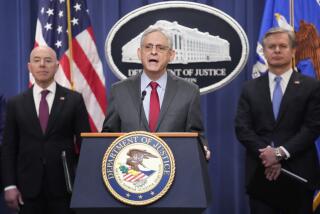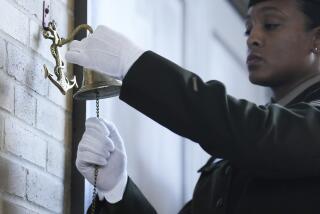U.S. jury convicts four Blackwater guards in 2007 Iraq killings
For 10 weeks this summer in a downtown Washington courtroom, the trial of four former Blackwater security guards unfolded as a morality play about American accountability to Iraqi civilians in the aftermath of the United States’ long military occupation.
Prosecutors flew in dozens of Iraqi witnesses — the most foreigners ever to assist in a Justice Department prosecution — to testify about scenes of graphic violence when a Blackwater convoy in Baghdad opened fire with automatic weapons, sniper rifles and grenade launchers into a crowded public square in 2007.
The father of a 9-year-old boy testified that he watched his son’s brains spill out at his feet. Seventeen Iraqis died and at least 17 more were injured, many seriously.
On Wednesday, thousands of miles and seven years away from that tragic September day, the drama ended with a U.S. federal jury convicting all four men in the killings, rejecting defense claims that the guards were responding to what they feared was a gunfire attack.
Seen by Iraqis as a test of the American justice system, the prosecution rekindled traumatic memories of a U.S.-led invasion and occupation that both sides would have preferred to leave in the past. Nearly 4,500 American service members and more than 100,000 Iraqis died during the eight-year U.S. military engagement.
It took the Washington jury an unusually long period — 28 days — to find Nicholas Slatten guilty of first-degree murder and three other guards — Paul Slough, Evan Liberty and Dustin Heard — guilty of voluntary manslaughter and firearm charges.
Slatten could face life imprisonment, while the remaining three defendants face 30-year mandatory minimum sentences, according to prosecutors.
The shootings stirred anti-U.S. passions around the globe and helped undercut Americans’ confidence in the mission in Iraq, particularly the use of private contractors, such as Blackwater, to supplement and, in some cases, replace the regular military.
The verdict, which defense attorneys vowed to appeal, comes at a delicate time for the Obama administration, which is relying heavily on the new Iraqi government to help fight Islamic State militants that have crossed the border from Syria and seized vast swaths of Iraq.
Mike McGarrity, a supervisor in the FBI’s Washington field office, said U.S. agents were scrambling Wednesday to locate and notify Iraqi witnesses about the verdicts, but many had been displaced by the Islamic State incursions.
“This trial was seven years in the making,” McGarrity said. “This turned out to be a very difficult time for them.”
Many Iraqis were skeptical that American courts were capable of delivering justice to Iraqi civilians. The insistence by the previous Iraqi government that Americans accused of crimes in Iraq be tried by Iraqi courts was a factor in President Obama’s decision to withdraw U.S. troops in 2011.
The guilty verdicts may ease some of those doubts, U.S. and Iraqi officials said.
“This verdict is a resounding affirmation of the commitment of the American people to the rule of law, even in times of war,” said U.S. Atty. Ronald C. Machen Jr., whose office led the prosecution.
Andrew G. McCabe, assistant FBI director in the Washington office, said the verdicts should provide “some measure of comfort to the victims’ families in Iraq.”
Lukman Faily, the Iraqi ambassador to the U.S., called the shootings a “painful incident for Iraqis,” but he said the verdicts would “help build confidence among Iraqis in our overall relationship with America” and demonstrate that “the American justice system did not approach the case with a bias in favor of the defendants and values Iraqi lives no less than American lives.”
During the trial, prosecutors and Iraqi witnesses described the shootings as unprovoked, the result of callous, trigger-happy civilian security guards who were nervous about intelligence reports that a white Kia carrying a car bomb was circulating in the city looking for a target.
The government presented testimony from 71 witnesses, including 30 from Iraq. Also testifying for the government were nine members of Raven 23, the Blackwater team on the scene that day.
The defense, which called only four witnesses, characterized the killings as a tragic mistake that started when unknown Iraqis opened fire on the Blackwater convoy. Defense attorneys cautioned the jury against second-guessing the actions of fellow citizens who were reacting to what they believed was the sound of gunfire in a war zone.
Acknowledging that innocent civilians were killed, they contended that their clients fired in self-defense in “the fog of war.”
But in many people’s minds, the use of contractors such as Blackwater came to symbolize all that was wrong with the U.S.-led occupation of Iraq.
The Nisoor Square shooting was only one of numerous incidents of violence involving private security contractors during the Iraq war, according to Susan Burke, an attorney who has represented victims in civil suits against Blackwater.
Burke said she hoped the verdicts would encourage the military to curtail the use of private contractors. “This should send a clear signal to our society that we seriously need to rethink using mercenaries,” she said.
Prosecutors had to overcome numerous challenges and some early government missteps that almost led to the collapse of the case.
Justice Department prosecutors accused their State Department colleagues who were on the scene after the shootings of having intentionally tried to help exonerate Blackwater, which was working under contract to the State Department.
Prosecutors said State Department investigators had picked up shell casings that might have connected specific guards to individual casualties and stuffed them in their pockets.
Later, the State Department granted some contractors limited immunity, leading one federal judge to throw out the charges in 2009. A federal appeals court overturned that judgment in 2011.
State Department deputy spokeswoman Marie Harf said Wednesday that after the shootings, the department “took a number of steps to strengthen oversight of private security contractors, such as moving quickly to improve investigative policies and strengthening procedures for use of force and less-than-lethal force by security contractors.”
Defense attorneys argued during the trial that the most aggressive shooter was the government’s own star witness, Jeremy P. Ridgeway, who pleaded guilty to manslaughter and agreed to cooperate. Ridgeway, who faces a maximum sentence of 22 years, was the real villain, defense lawyers argued.
James Stewart, a law professor at the University of British Columbia in Canada, said the verdicts conveyed a strong image of the American legal system at work.
“In the end, there aren’t that many countries in the world where trained military professionals working for a powerful company who were contracted to work for the State Department in a foreign war zone would be held accountable,” he said.
Stewart said that Blackwater’s conduct was “clearly excessive” and that jurors may have found some of the technical arguments used by the defense — including questions about legal jurisdiction — as “morally irrelevant” in the face of the crimes.
Dogged by complaints over its conduct while serving in Iraq and having lost its contracts to provide protection for the State Department, Blackwater renamed itself Xe Services in 2009.
The company’s owner, Erik Prince, later sold the company to Los Angeles-based investors who renamed it once more in 2011. The firm, now known as Academi, emphasizes a new code of conduct and professionalism.
Jurors reached guilty verdicts on nearly all of the combined 33 counts. Judge Royce Lamberth declared a mistrial on three remaining charges of manslaughter and attempted manslaughter against Heard.
The four defendants remained impassive and motionless as the verdicts were read. Lamberth asked them to remain seated during the lengthy recitation.
Defense attorneys vowed to appeal, saying they believed the government had erred in treating the men as Defense Department contractors when they instead worked for the State Department.
“This was a long and complicated trial that raised a lot of issues with the jury that will be raised in a motion for a new trial,” said David Schertler, an attorney who represented Heard.
The men were taken into custody despite defense attorneys’ objections that they posed no flight risk. In some cases, the defendants had returned from trips overseas to attend the trial, attorneys said.
Some lawmakers praised the verdict, saying it demonstrated that the federal government needed to do a better job of holding its contractors accountable.
“It should not have taken this long for justice to be served,” Senate Judiciary Committee Chairman Patrick J. Leahy (D-Vt.) said in a statement.
Leahy has proposed legislation that would allow U.S. contractors to be more easily prosecuted for crimes they commit overseas.
More to Read
Start your day right
Sign up for Essential California for news, features and recommendations from the L.A. Times and beyond in your inbox six days a week.
You may occasionally receive promotional content from the Los Angeles Times.








